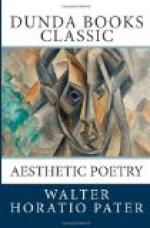“Pray but one prayer for
me ’twixt thy closed lips,
Think but one thought of me up in the stars,
The summer-night waneth, the morning light slips,
Faint and gray ’twixt the leaves of
the aspen,
betwixt the cloud-bars,
That are patiently waiting there for the dawn:
Patient and colourless, though Heaven’s
gold
Waits to float through them along with the sun.
Far out in the meadows, above the young corn,
The heavy elms wait, and restless and cold
The uneasy wind rises; the roses are dun;
Through the long twilight they pray for the dawn,
Round the lone house in the midst of the corn.
Speak but one word to me over the corn,
Over the tender, bow’d locks of the
corn.”
It is the very soul of the bridegroom which goes forth to the bride: inanimate things are longing with him: all the sweetness of the imaginative loves [221] of the Middle Age, with a superadded spirituality of touch all its own, is in that!
The Defence of Guenevere was published in 1858; the Life and Death of Jason in 1867; to be followed by The Earthly Paradise; and the change of manner wrought in the interval, entire, almost a revolt, is characteristic of the aesthetic poetry. Here there is no delirium or illusion, no experiences of mere soul while the body and the bodily senses sleep, or wake with convulsed intensity at the prompting of imaginative love; but rather the great primary passions under broad daylight as of the pagan Veronese. This simplification interests us, not merely for the sake of an individual poet—full of charm as he is—but chiefly because it explains through him a transition which, under many forms, is one law of the life of the human spirit, and of which what we call the Renaissance is only a supreme instance. Just so the monk in his cloister, through the “open vision,” open only to the spirit, divined, aspired to, and at last apprehended, a better daylight, but earthly, open only to the senses. Complex and subtle interests, which the mind spins for itself may occupy art and poetry or our own spirits for a time; but sooner or later they come back with a sharp rebound to the simple elementary passions—anger, desire, regret, [222] pity, and fear: and what corresponds to them in the sensuous world—bare, abstract fire, water, air, tears, sleep, silence, and what De Quincey has called the “glory of motion.”




